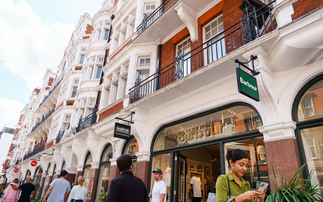The Big Question: Lockdown 2.0

As the second national lockdown takes effect, industry commentators tell Investment Week what they believe will be the long-term ramifications on the economy and which areas of the UK market are safest/most at risk.

David Kneale, head of UK equities at Mirabaud AMDramatic upside A month-long lockdown, on its own, is unlikely to make much difference to most businesses and matters even less to investors.
The first lockdown created pandemonium as businesses were caught with enormous working capital exposures, no ability to operate in a 'Covid-secure' manner and a backdrop of financial market panic.
Today, most businesses have established comfortable liquidity buffers and access to extensive government support mechanisms.
It is no surprise there has been no liquidity strain on financial markets. Tellingly, both Crest Nicholson and Howdens (both heavily disrupted previously) are proposing restarting dividends and repaying government support despite the lockdown.
Equally important is hope. News of a vaccine (with significant data hopefully imminent) could offer hope of light at the end of the tunnel; further hardship is endured and stressed businesses survive.
This news would be equally important for investors, as equities will be valued on long-term recovered cashflows rather than short-term distress.
Some companies may not survive the continued disruption awaiting a vaccine roll-out, but for the survivors the investment upside is dramatic.

Kartik Kumar, manager of the Artemis Alpha Investment TrustLimited impact Over the long term, a four-to-six-week lockdown now should have a limited negative economic impact.
Weaker businesses in sectors such as leisure and retail will not survive and this will cause permanent damage.
More broadly, consumers and businesses have revised behaviours, and the last lockdown demonstrated their adaptability.
Government intervention in the shape of loans, low interest rates and an extension of the furlough scheme should further help limit scarring to the economy.
UK housebuilders suffered damage during the first lockdown as they could not build houses. This time, construction has been allowed to continue.
Unlike in the travel and leisure sector, the demand for housing in lockdown is deferred not lost.
UK housebuilders have strong balance sheets, trade on low multiples and are addressing a deficit of housing supply accumulated over a decade.
We would steer clear of sectors where consumer behaviour is changing as this creates greater scope for making a misjudgement about the long term.
Examples of this include cinemas and retail real estate where the pandemic has created damage and also accelerated pre-existing shifts.

Silvia Dall'Angelo, senior economist at the international business of Federated HermesSilver linings The Covid-19 crisis is proving sharper and longer-lasting than initially expected. Following the second wave and related restrictions, UK GDP is to contract by at least 10% in 2020, while prospects for recovery next year remain uncertain.
Sharp and protracted hits to activity and employment are typically associated with loss of potential growth, as hysteresis effects settle in.
Notably, the longer workers stay out of a job, the likelier skill losses and mismatches become down the road.
That said, there might be silver linings. For a start, the Covid-19 crisis could trigger a process of creative destruction, boosting productivity.
Indeed, businesses have come up with new, creative and more effective ways to deliver their goods and services, from stepping up the diffusion of technologies for working from home, to strengthening operations to support online shopping.
Also, the crisis has acted as a catalyst to unleash public spending, with the UK leading the way in terms of coordination between monetary and fiscal authorities.
This framework – if successful in responding to the crisis – could be applied to tackle some of the more urgent challenges of our times, notably climate change, as the UK is committed to reduce its net carbon emissions to zero by 2050.

Ahmer Tirmizi, senior investment strategist at 7IMCyclicals In March, we feared Covid-19 could be a re-run of the deadly Spanish Flu from 1918, and the level of restrictions reflected that.
We now know this is not the case. We also know the virus can be defeated – just look at East Asia. Plus we are also better prepared with the likes of PPE.
We have all adjusted our behaviour, and Covid-19 has become a known quantity. So, while the recent increase in case numbers is meaningful, we will not see a re-run of March/April this year with construction sites, factories and the housing market all remaining open.
From an investor's perspective, lockdown is a moment of peak fear. In March, markets bottomed on the day the UK-wide lockdown began.
There would have been no better time to invest in equities this year than when it felt most worrying.
We are close to peak panic again, and we are looking to position for an economic recovery in the UK and abroad.
This means favouring cyclical sectors such as industrials and consumer discretionary, and moving away from the sectors that have done well through the recession, such as consumer staples.

Colin Morton, vice president, lead manager of the Franklin UK Equity Income and Franklin UK Rising Dividends fundsPharmaceuticals The biggest concern about a second lockdown is that unless there is a long-term solution we may find ourselves in an unsustainable situation where the economy is continuously reopened and locked-down over the next 18-month period.
The second lockdown and the extension of the furlough scheme also raises the question about how long the UK Government can keep propping up the economy?
The deficit has significantly increased over the past six months, and this will inevitably have an impact on taxation longer-term.
While the second lockdown is less stringent, it will still have severe repercussions for non-essential retailers, particularly listed companies in the leisure and entertainment sectors.
The second lockdown may not feel as severe as the first in other parts of the economy. Housebuilders are being encouraged to continue building, with builders' merchants still open.
Pharmaceutical and utility companies are the safest areas, as well as those that produce staple products that consumers need and rely on.

Karen Ward, chief market strategist EMEA at J.P. Morgan Asset ManagementUK gilts With some businesses forced to close again and consumers told to stay at home, the UK economy is likely to contract in the fourth quarter, albeit to a far lesser extent than earlier in the year.
The economic outlook beyond that rests largely on the extent of lasting scars from this latest period of lockdown.
The government's actions to support businesses and consumers to stay afloat proved effective earlier on in the year, but they must continue to extend support to shelter the economy through the difficult winter.
For some businesses though, faced with the uncertainty of how long this crisis may last, they may decide to make lasting decisions to either cut jobs or cease trading.
We expect the Bank of England will conclude that negative rates are a new way of supporting the economic recovery. This presents some upside to UK gilt prices, even from these lofty starting points.
Within stocks, we prefer those which benefit from the secular trends that have been accelerated by the crisis such as high-quality retailers with a strong online offering, online media, and housebuilders.

Mike Riddell, head of macro unconstrained at AllianzGINon-UK markets As an open economy, the economic performance of the UK remains intertwined with the challenges being faced on a global scale.
For the past month, we have thought that the rise in Covid-19 cases, both in the UK and globally, is a much bigger risk to financial markets than the US election.
Everyone was hedged for a messy US election, which explains the euphoria afterwards, even though it has turned out pretty close to the mess investors were worried about.
However, markets do not appear to be hedged for a Covid-19 resurgence, where we are in a semi-lockdown in not only the UK, but also much of the rest of Europe.
It is now difficult to find a UK 'risk off' hedge – gilt yields cannot go much lower without negative Bank of England rates (which we still think unlikely, and definitely not imminent), while the pound is the opposite of a safe haven.
Other UK-based risky assets look vulnerable. We prefer non-UK markets for our safe haven hedges, and we are bearish on sterling given the Covid-19 risks (not to mention Brexit).

Kaspar Hense, senior portfolio manager at BlueBay Asset ManagementMore QE The ill-timed second lockdown means more fiscal and monetary support is needed short to medium term.
However, the UK Government is desperate to support corporates and the economy for the time being.
The government has already announced an extension of the furlough schemes and we also expect more support for the self-employed to be unveiled. But despite more support, the UK economy is likely to contract in Q4.
The most Covid-impacted sectors, leisure and hospitality, as well as small businesses will be hit hard by the lockdown and unemployment has further to rise.
With that we would expect the pressure to be mainly on less liquid assets in the direct lending and distressed space.
With a potential Biden outcome in the US election it places more pressure on the UK Government to strike a Brexit deal, which it is desperate to get behind us in order to re-focus to a more pro-growth strategy.
But even with a trade deal, the hit to the economy from the pandemic does not bode well for economic growth.

Adam Walford, partner at law firm Howard Kennedy
UK market
It all feels like Groundhog Day: businesses are yet again being supported by the Coronavirus Job Retention Scheme (CJRS). But notwithstanding this support, there are still some which may not survive this second lockdown.
Undoubtedly the CJRS extension is welcome but much has already been paid out. The scale of impending job losses are likely to cause the most overt long-term ramifications on the economy.
Fundamentally the UK's economy is services led and that is ultimately funded by the consumer pound.
If job losses do come to pass, there will be a consequent reduction in consumer spending confidence, and we will see investors liquidating their investments to live off their savings. That will inevitably trigger a downturn in consumer spending.
In terms of the safest areas of the UK market, look to businesses which have made highly astute investments and those whose long-term investment strategy has been focused on the future, alongside those which have harnessed the power of technology and adapted accordingly.
It all feels like Groundhog Day: businesses are yet again being supported by the Coronavirus Job Retention Scheme (CJRS). But notwithstanding this support, there are still some which may not survive this second lockdown.
Undoubtedly the CJRS extension is welcome but much has already been paid out. The scale of impending job losses are likely to cause the most overt long-term ramifications on the economy.
Fundamentally the UK's economy is services led and that is ultimately funded by the consumer pound.
If job losses do come to pass, there will be a consequent reduction in consumer spending confidence, and we will see investors liquidating their investments to live off their savings. That will inevitably trigger a downturn in consumer spending.
In terms of the safest areas of the UK market, look to businesses which have made highly astute investments and those whose long-term investment strategy has been focused on the future, alongside those which have harnessed the power of technology and adapted accordingly.










Given the UK is deep into a second lockdown, we ask industry commentators what they believe will be the long-term ramifications on the economy and which areas of the UK market are safest/most at risk?
Given the UK is deep into a second lockdown, we ask industry commentators what they believe will be the long-term ramifications on the economy and which areas of the UK market are safest/most at risk?
Related Topics
-
UK

-
Markets

-
Lockdown 2.0

-
UK

-
Ahmer Tirmizi

-
Kaspar Hense

-
the big question

-
Lockdown

-
UK equities

-
UK Growth

-
UK income

-
UK Equity Income

-
homebuilders

-
consumer retail

-
Entertainment & Culture

-
leisure sector

-
hospitality sector

-
coronavirus

-
Covid-19

-
pandemic

-
public health

-
Brexit

-
David Kneale

-
Mirabaud

-
Kartik Kumar

-
Artemis

-
Silvia Dall’Angelo

-
Federated Hermes

-
7IM

-
Seven Investment Management

-
Colin Morton

-
Franklin Templeton

-
pharmaceuticals

-
Karen Ward

-
J.P. Morgan Asset Management

-
Mike Riddell

-
Allianz Global Investors

-
BlueBay Asset Management















